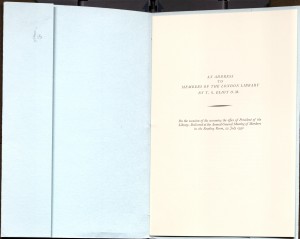[Posted by Jordan Wilson, for Prof. David Rosen’s course, “Modern Poetry”]
 An Address to Members of the London Library by T. S. Eliot O.M.: On the occasion of his assuming the office of President of the Library. Delivered at the Annual General Meeting of Members in the Reading Room, 22 July 1952.
An Address to Members of the London Library by T. S. Eliot O.M.: On the occasion of his assuming the office of President of the Library. Delivered at the Annual General Meeting of Members in the Reading Room, 22 July 1952.
At sixty-three years old, T. S. Eliot succeeded Giles Fox-Strangways, 6th Earl of Ilchester as the ninth President of the London Library. Other predecessors included Irish poet Alfred, Lord Tennyson and the Scottish essayist, Thomas Carlyle. Eight years earlier, the Library lost close to 16,000 volumes in a bombing during the Second World War. Today. The collection holds over a million volumes with 97% of the collection available for lending and at 173 years old, the Library is kept under the English playwright, Sir Tom Stoppard.
In his address, Eliot attends to two questions: “Can such a library, limited to members and supported by subscriptions, survive? And, ought it to survive?” Eliot and his milieu have just traversed into modernity where there were many questions that needed to be addressed. Expatriotism and the Wars encouraged poetry and discourse to approach different methods. New styles were accepted. The social sciences had just entered the main stage and the modern artists were dealing with a new world in which its old God was announced dead.
Having achieved a status of laureateship in poetics and in academia, and being credited as the father of modern poetry, T. S. Eliot looked on the members of the London Library as his next matter of business. Eliot had been prolific in his influence over literary discourse and he affirmed his own status. But Eliot’s intention was no more than to uphold the tradition of his predecessors so that the community may continue to survive. In his speech, Eliot isolated himself from his position as President in a way that echoed that echoed the tradition of literature rather than his own “parenthetical” anecdotes, which had “no direct bearing upon [his] main theme.” Eliot called himself indebted to the library, saying that without it, “many of [his] early essays could never have been written.” The Library became to Eliot what the café setting meant to Picasso. The difference: Eliot was content with his dialogue, which took place between himself and books.
The collection of the Library, Eliot recalls as being the only “of [its] size which contains so many of the books which [one] might want, and so few of the books which [Eliot] cannot imagine anyone wanting.” This feat was only accomplished by the Library’s “certain homogeneity of membership,” which seemed to be a crucial element of the Library’s mores. However, with its selective style, the Library has curated a prodigious collection that has brought it to stand as the world’s largest independent lending library. The institution’s Carlyle Fund provides scholarship for those with a true interest in joining, but cannot pay the annual fee.
In Eliot’s speech, he makes it evident that the availability of such a curated collection needs to remain standing, as it is vital to its culture as a whole. The absence of the London Library, “would be a disaster to the world of letters, and would leave a vacancy that no other form of library could fill.” With the scope of accepted literatures forever expanding since the days of the divide between high and low art, this simple booklet, which transcribes Eliot’s speech, reminds its reader of what role a collection of reference means to a culture. This cannot be the case of a library with “the awful burden of having to accept every book that is sent them.” The London Library’s Committee may provide for its interested members those publications that are worth preservation throughout this time and all time when discourse expands. What members gain is a haven of space where they are protected from the copious amount of lapsus linguae, which exists in literary output today.